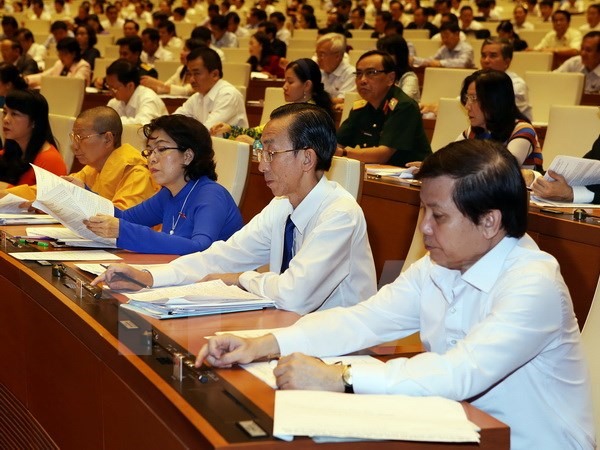 Politics & Law
Politics & Law

Supervising activity of the National Assembly (NA) should be conducted in a compact and economical manner to avoid causing burden to localities.
 |
| Parliamentary supervision should not impede localities by demanding too much time and effort away from their regular work, members of the National Assembly Standing Committee agreed yesterday. — VNA/VNS Photo Nguyễn Dân |
HÀ NỘI – Parliamentary supervision should not impede localities by demanding too much time and effort away from their regular work, members of the National Assembly Standing Committee agreed yesterday.
They also agreed that the NA’s supervisory work should be compact and more economical.
The NASC met in Ha Noi yesterday morning to discuss draft regulations on the parliament’s supervisory work.
Most members agreed with a proposal to fix annual quantitative limits for NA and NASC supervising teams, including the maximum number of supervising teams, the number of subjects to be supervised, or the number of localities subject to supervision.
NA Deputy Chairman Phùng Quốc Hiển noted that local authorities and organisations had to receive many supervising teams from the NA every year, not to mention those from the Government or auditing agencies.
"The fact that localities and organisations have to spend a lot of time for these inspections and assessments seriously affects their operational efficiency," he said.
He suggested that when the NA or the NASC supervise implementation of a certain law or policy, they should select a few localities, not all 63 city and provinces nation-wide.
He added that the Deputy NA chair in charge of supervison should co-ordinate with responsible bodies to ensure that each locality receive a maximum of 2-3 supervising teams a year.
Don’t be pompous
Supervising teams should also avoid pretentiousness in conducting their activities, Hiển said.
“For example, we should limit the number of cars used for travelling, avoid wasteful things like welcoming banners or slogans, or organising too many conferences and seminars,” he said.
NA General Secretary Nguyễn Hạnh Phúc cited the example of a supervision team visiting as many as 34 provinces and a dozen industries and sectors.
“The numbers look impressive, but the effectiveness was modest,” he said.
NA Vice Chairwoman Tòng Thị Phóng suggested the application of advanced IT technologies to simplify and increase the efficiency of supervisory activities.
Nguyễn Thị Kim Ngân, NA Chairwoman, proposed changes in rules on persons subject to formal questioning by NA deputies.
Under current regulations, senior officials including ministers are not allowed to authorise his or her inferiors to answer questions on their behalf during an NA working session.
Ngân suggested that the rules be made more flexible in order to avoid situations when the person has other, very important matters to attend to.
“The regulation should grant the NASC authority to decide whether another person can stand in after the responsible person makes a request,” she said.
Specially for Hà Nội
Also yesterday, the NASC discussed a draft decree offering special financial and budget management mechanisms for Hà Nội, granting it greater leeway in making decisions.
The decree aims to replace a similar one issued in 2004 that no longer matches new socio-economic development challenges faced by the city.
Under the draft decree, Hà Nội will be allowed to overspend its budget to invest in medium-term investment plans approved upon by the city’s People’s Council.
The quota for overspending will be decided annually by the NA while the specific amount will be decided by the city People’s Council in conformity with the ceiling that the NA has set.
The overspending will be compensated by domestic loans from issuing local bonds, reborrowing from Government’s loans and other sources. The city is not allowed to borrow from foreign sources to make up for budget overspending.
For some important projects on the environment, transportation and irrigation that exceed its financial capacity, Hà Nội can ask for the support from the State Budget.
The Government will also prioritise Hà Nội in terms of allocating Official Development Assistance (ODA) and other preferential capital to invest in programmes and projects to build infrastructure, protect the environment or enhance social welfare.
Every year, if Hà Nội’s budget revenues exceed the Government’s forecast/target for the city, it will be allowed to retain 30 per cent of the extra revenue for investing in development projects .
Some members of the NASC suggested that this percentage be increased to make it conform with the Law on Capital, which regulates that the capital city can retain a majority of the extra revenue it generates.
They also voiced concern that the draft decree is not very different from existing laws and regulations on financial mechanisms for the capital city.
In fact, some of the regulations are less favourable to Ha Noi than existing ones, according to Đinh Văn Nhã, Vice Chairman of the NA’s Finance and Budget Commmittee.
Chairman of Hà Nội’s People’s Committee, Nguyễn Đức Chung, asked the Government to consider granting the capital city more authority to decide on important transportation and environmental projects to tackle the serious problems that the city is facing.
He also asked the Government to allow the capital city to keep the money collected from equitisation of State-owned enterprises that the city is in charge of, and to use land-use fees collected to supplement the city’s budget.
Acknowledging the very important position of Hà Nội as the capital city, NA Chairwoman Ngân wanted the Government to take in to account the opinions of NASC members in formulating a decree that creates much more favourable conditions for Hà Nội than current laws and regulations.
“Otherwise, we do not need a new decree,” she said. – VNS




